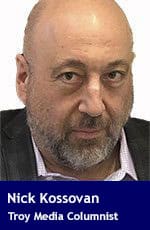The key to your job search success is highlighting your competitive edge

For interview requests, click here
Most job seekers present themselves to employers as a jack of all trades, master of none, when they should be showcasing their unique set of skills. Think about it: you believe you’re talented, but so does everyone else you’re competing against. What makes you special?
Having the necessary skills and qualifications is no longer enough in today’s competitive job market. To stand out, you need to identify and communicate what sets you apart. Your competitive advantage – the unique skills, experiences, and attributes that make you one-of-a-kind – is the key to becoming memorable. Without it, you risk blending in with the sea of candidates vying for the same opportunities.
To define your competitive advantage, start by asking yourself these key questions:
- What are my favourite tasks?
Most of us enjoy activities we’re naturally good at. Whether working with numbers, designing costumes, conducting research or organizing events, our strengths tend to create a natural talent for these activities. This makes them enjoyable because we’re not constantly fighting against our own limitations.
| Recommended |
| Emotions are the hidden driver of organizational success
|
| Resume trickery never works
|
| How to make yourself the obvious choice for getting hired
|
Take some time to list all the tasks you’ve enjoyed in your career or outside of work. Don’t limit yourself to strictly work-related activities – include hobbies or side projects. For example, if you love baking, this might reveal strengths like attention to detail, creativity or precision. The goal is to identify where your passions align with your strengths.
The tasks you enjoy often reveal your competitive advantage, giving you an edge in roles that align with these strengths.
- What feedback have I received from colleagues or supervisors?
Throughout your career, you’ve likely received feedback in various forms, from formal performance reviews to casual comments. Reflect on what others have consistently noticed about you. Have colleagues said you’re a great listener? Have supervisors commended your ability to stay calm under pressure? Even offhand remarks can offer valuable insight into your standout qualities.
For example, a colleague might have said, “I always feel heard when I talk to you,” or a manager might have noted, “You have a knack for simplifying complex problems.” These comments provide clues about what makes you unique and valuable. Negative feedback can also highlight areas you’ve improved, which can now become part of your narrative.
Feedback helps uncover the qualities that others see in you, offering a fresh perspective on your competitive advantage.
- What problems have I successfully solved in previous positions?
Every job exists to solve a problem. For example, accountants are hired to monitor finances, ensure compliance with tax laws and provide insights for decision-making. Think about the specific challenges you’ve addressed in your roles. Did you find innovative ways to increase website traffic? Reduce operational costs? Improve customer satisfaction? Solve safety issues? These are the contributions employers care about most.
Quantifying your achievements, where possible, makes them even more impactful. For instance, instead of saying, “I improved sales,” you could say, “I spearheaded a marketing campaign that increased sales by 25 per cent over six months.” Specific results are memorable and demonstrate the tangible value you bring to an organization.
By highlighting your problem-solving skills and measurable results, you show employers how your competitive advantage directly benefits them.
- What unique experiences or backgrounds contribute to my skill set?
Your life experiences shape who you are and what you bring to the table. A candidate who grew up in Quebec City might emphasize fluency in French as a mother tongue, offering an edge over someone who attended French immersion. Similarly, someone who spent summers working at their family’s hotel may have developed exceptional customer service skills and a strong work ethic.
Consider how your background has shaped your strengths. For example, if one of your parents was a social worker, you might have gained unique empathy and interpersonal skills. If your father was a pharmaceutical representative, you may have developed an early understanding of human dynamics and sales strategies. Sharing these stories adds depth to your narrative and makes your competitive advantage more relatable.
Your unique experiences differentiate you from other candidates, providing context for your strengths and abilities.
- What skills have I gained through hobbies or volunteer work?
Skills aren’t just acquired at work or school. Hobbies, volunteer work and even life experiences can provide valuable abilities that set you apart. For instance, I once hired a call centre agent who had volunteered at a suicide prevention hotline. Their ability to listen and empathize was unparalleled.
Similarly, a candidate who coached a little league baseball team demonstrated exceptional leadership and team-building skills, making them an outstanding first-time manager. Don’t underestimate the value of experiences gained outside traditional employment – these can often showcase soft skills like patience, creativity and adaptability.
Your non-work experiences can reveal hidden skills that enhance your competitive advantage and appeal to employers.
Communicating your value
Once you’ve identified your competitive advantage, it’s time to communicate it effectively. Simply listing “skills” and “qualifications” isn’t enough – you need to present them as part of a compelling narrative that highlights your unique value proposition.
For example:
- Not memorable: “I speak French.”
- Memorable: “I was born in Quebec City, and French is my mother tongue.”
Go beyond stating your qualifications by explaining how they’ve benefited past employers:
- No value add: “I have strong analytical skills.”
- Value add: “During my seven years as a financial analyst at Wayne Enterprises, I developed analytical skills that helped the company capitalize on several lucrative IPOs, including one that generated a $7.5-million gain in under a year.”
Why being memorable matters
In a crowded job market, candidates who fail to articulate their uniqueness risk being forgotten. Despite the countless interviews I’ve conducted, few candidates have shared stories that stuck with me – most simply list qualifications without adding any personal touch.
To stand out, you need to be mentally sticky. By identifying and clearly communicating your competitive advantage, you’ll not only capture attention but also leave a lasting impression. In a world full of qualified candidates, being memorable is your greatest asset.
Nick Kossovan, a well-seasoned veteran of the corporate landscape, offers advice on searching for a job.
Troy Media is committed to empowering Canadian community news outlets by providing independent, insightful analysis and commentary. Our mission is to support local media in building an informed and engaged public by delivering reliable content that strengthens community connections, enriches national conversations, and helps Canadians learn from and understand each other better.

